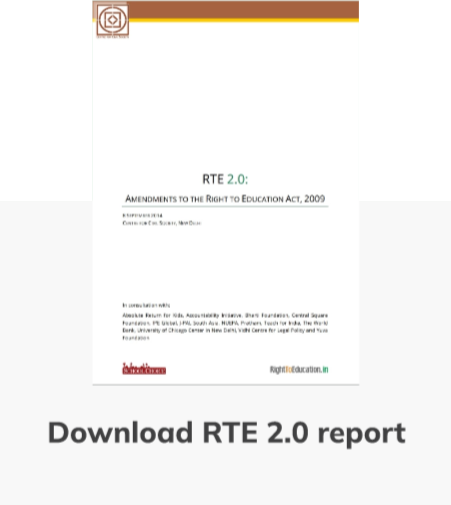With a stated motto of Inform-Engage-Reform, the RTE Platform is an initiative to bring together all the knowledge on India's landmark Right of Children to Free and Compulsory Education Act 2009.
At the RTE Platform, we are aspiring to establish it as a credible, informative and evolving resource on education in India, with a particular emphasis on primary education and the RTE Act.
The primary objectives of the portal are to
acts as an all-inclusive port of call on RTE-related information and updates from across the country, provides a birds-eye views on the status of implementation of RTE Act in different states including the 25% quota and enables individuals to browse all Supreme Court and High Court judgements on RTE
provides a space for stakeholders to interact, discuss, create, share experiences, and dispel myths regarding the historic Right to Education (RTE) Act. The portal also allows anxious parents to ask questions and get their queries redressed by in-house RTE experts.
provides access to reports and case studies on RTE related interventions across the country to encourage the sharing of best practices and increase accountability and improve governance.
With the objective of shifting regulatory focus towards some of the above issues, Centre for Civil Society brought together some of India’s eminent educationists and thought leaders to identify specific amendments to the RTE Act, which would ensure quality education for all in India. Key concerns regarding the structure and impact of the RTE were discussed, and based on this, recommendations for amendments to the RTE Act 2009 have been drafted. RTE 2.0: Building Consensus on Amendments truly aimed at weeding out the pain areas in the existing scheme of things, finding out what works and what doesn’t, and introducing actual amendments to the text of the Act.
The Right of Children to Free and Compulsory Education Act 2009 (or Right to Education, in short) was passed in both the Houses of Parliament in August 2009. The Right to Education Bill has been debated, discussed and deliberated by various Government commissioned bodies since 2002 (National Advisory Council, National Knowledge Commission, Central Advisory Board for Education), Standing Committee for Human Resource Development and civil society organisations (including Azim Premji Foundation, Confederation of Indian Industry and Centre for Civil Society). We track the evolution of discourse around the Act, broadly divided in to three thematic areas:
-
Legislation
- The Right of Children to Free and Compulsory Education (Amendment) Bill, 2010
- The National Council for Teacher Education (Amendment) Bill, 2010
- Sibal and Das on RTE
- Times of India, 21 February 2010: Sibal for easing norms to let small schools stay
- Model Rules under the Right of Children to Free and Compulsory Education Act 2009
- Times of India, 13 February 2010: Right to education kicks in on April 1
- Draft Model Rules under the Right of Children to Free and Compulsory Education Act 2009
- Times of India, 21 January 2010: Right to Education: HRD frames model rules for states
- The Hindu, 07 January 2010: Right to free education law will be enforced in April-May
- Right of Children to Free and Compulsory Education 2009
- Amendments to RTE bill, 8 July 2009
- 86th Amendment to the Constitution
- Report of the Central Advisory Board of Education (CABE) Committee on Free and Compulsory Education Bill and Other Issues Related to Elementary Education
- NAC recommendations on right to education
- National Knowledge Commission recommendations on right to education
- Rajya Sabha synopsis of debate (20 July 2009)
- Parliamentary Standing Committee on HRD report on The Right of Children to Free and Compulsory Education Bill, 2008
- Text of Right to Education Bill, 2005 [Draft]
- The Right of Children to Free and Compulsory Education Bill, 2008
-
Analysis
- Matrix for drafting state rules under the RTE act by School Choice Campaign
- School Choice Campaign's recommendations on mechanism for implementation of 25% reservation in private schools
- Suggestions from CCS (March 2010) on Model Rules unde The Right of Children to Free and Compulsory Education Act, 2009
- Amit Kaushik, Tehelka, 8 August 2009: Blackboard Jungle
- Baladevan R, CFO Connect, October, 2009: The devil is in the details
- Implementing the RTE: Promises, Potential and Pitfalls
- MR Madhavan, Financial Express, 28 July 2009: For schools, the angel is in the details
- Parth Shah, Economic Times, 24 July 09: Will education bill guarantee quality?
- Swami Aiyar, Times of India, 14 June 09: Swaminomics: An open letter to Kapil Sibal
- PV Indiresan, Indian Express, 23 July 09: Education is the real victim
- Renu Singh (Director of Policy and Technical Support, Save the Children - India), Times of India, 6 July 09: The wrongs in the Right to Education bill
- Tavleen Singh, Indian Express, 28 June 09: End license raj
- Madhav Chavan, Indian Express, 25 June 09: Wiping the Slate Clean
- PV Indiresan, Hindu Business Line, 22 June 09: Politics of Education
- Suggestions from CCS (February 2009) on The Right of Children to Free and Compulsory Education Bill, 2008
- Madhav Chavan, Indian Express, 13 Feb 2009: The Bill is short on transparency and accountability
- Amit Kaushik, Ex-Director, Ministry of HRD (2001-2006)
- Azim Premji Foundation's Position on the Right of Children to Free and Compulsory Education Bill, 2008
- Confederation of Indian Industry (CII) National Committee on Education's Petition to the Parliamentary Committee on Human Resource Development, w.r.t. The Right of Children to Free and Compulsory Education Bill, 2008
- Legislative Brief on The Right of Children to Free and Compulsory Education Bill, 2008 by PRS Legislative Research
- Suggestions from CCS (November 2005) on The Right to Education Bill, 2005
- Suggestions from CCS (January 2004) on The Free & Compulsory Education Bill, 2003
